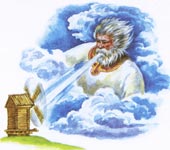
In Slavic mythology, Stribog is the god of the wind.
To understand his role it is necessary to look how the name of this god is built. One part of the name indicates that it is a god, because the name contains the word god (bog). While the first part of the name stri indicates the role of Stribog: one that extends. He was depicted as an old man who had a warrior horn and lived on the edge of light in deep woods or on an island in the middle of the sea or ocean.
With this horn he woke the winds, his grandchildren. Due to these characteristics many military commanders have identified Stribog and saw him as their idol.
Even the princes often built his idols and respected them. Sailors prayed to god Stribog to give wind at their sails. Stribog was particularly revered in Russia of Kiev by the Eastern Slavs. The main temples of Stribog were on islands in the sea, where merchant ships often stopped. The merchants brought rich gifts to Stribog before the ship went on the open sea.
According to legend, Stribog was considered the master of the winds, as well as Perun the commander of thunder and lightning. He, along with Svarog, had won the Black Snake, had helped Perun in his fight with the beast Skipper, and Horz in his fight with the moon.
Stribog was the protector of Vesna (Goddess of Spring). He as a god of wind and air every spring accompanied Vesna on the wings of spring breeze. Together they announced early spring and brought warmth to the world and better living conditions.
The eagle was the animal dedicated to him.
READ ALSO:
Dazbog was the god of fire, sun and rain
Perun is the god of the sky and thunder
Vesna was the goddess of spring
Horz is associated with the Moon
Radgost was the god of hospitality








